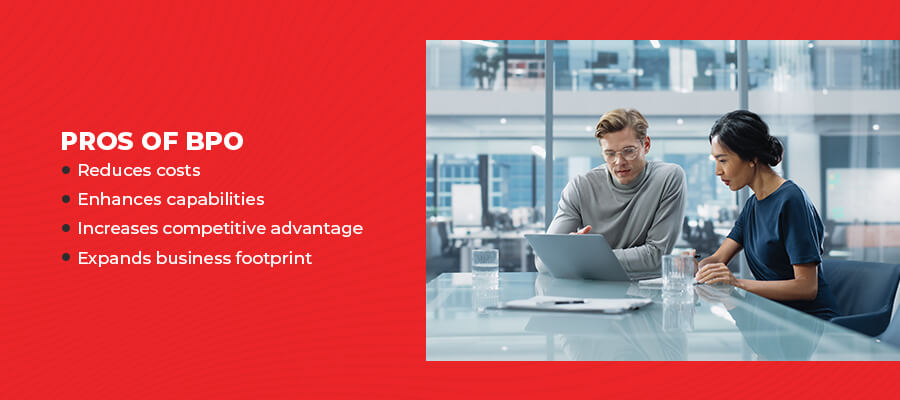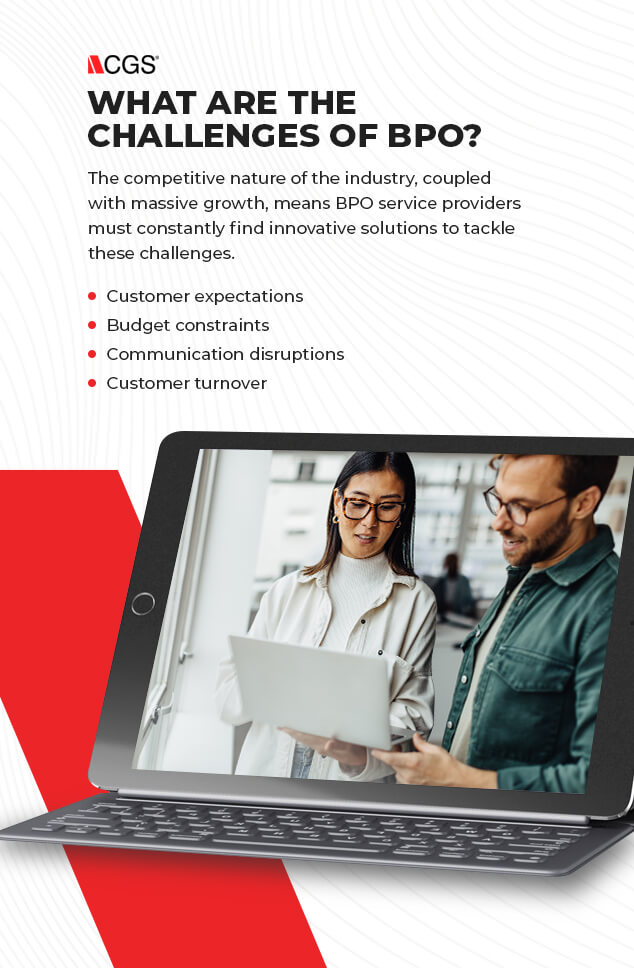What Is Business Process Outsourcing (BPO) and How Does It Work?
“BPO” refers to business process outsourcing, which is when a company outsources operations or functions to a third-party business processing service provider. There are many reasons a company chooses to use BPO, some of them being to reduce costs or harness the expertise of the BPO provider.
In this article, we'll look closely at the definition of business process outsourcing, the benefits and drawbacks of BPO, and the crucial information you need to know when investing in a BPO partnership.
What Is BPO?
Business processing outsourcing involves outsourcing a business function to a third-party service provider. For example, a company may outsource its marketing services or cybersecurity offerings to an external vendor.
Back-office business process outsourcing is when a business outsources one of its core internal functions. Outsourced operations in this category include payroll, accounting, data capturing, human resources, IT services, quality assurance, cybersecurity and regularity compliance. Front-office BPO refers to the outsourcing of customer-facing processes. These functions can include telemarketing, tech support, social media and sales.
BPO originated as a practice in the manufacturing industry, where manufacturers outsource parts of their supply chain to vendors. It is now a popular approach among various industries.

What Is a BPO Company?
A BPO company provides the service and resources you need for your specific business function. It gives you insights and advice on improving efficiency and effectiveness in a particular process.
A BPO company can either be on shore, where the vendor is located in the same country as the company, nearshore, which refers to a service provider in a neighboring country, or offshore, which is outside the business's home country.
How Does BPO Work?
First, through careful consideration and data insight, determine which processes in your business will thrive with a BPO service provider, saving you time, giving you access to notable resources, improving performance and positively impacting your bottom line.
Once your business identifies what processes need outsourcing, the search begins for an appropriate BPO service provider. By compiling a detailed list of requirements and scope of work, which sometimes shapes a request for proposal, you'll find the right company to meet your needs and pricing and add value to your business.
After selecting a BPO service provider, the next step is determining the contract type. Both organizations must agree on the terms of the agreement and detail the quality of the service along with the metrics to determine the success of the outsourcing service. It's also important to note that outsourcing may require you to invest in new technology to enable a smooth transition.
Shifting work from in-house to an external provider affects employees and current established processes. Implementing an effective change management strategy will ensure a successful and seamless transition.
Companies choose to use business process outsourcing for several reasons. A startup may need to outsource specific functions because they need more resources to manage them — a rapidly growing company can get additional support through BPO. Larger, well-established businesses often turn to BPO when looking for a service provider with the expertise to run the processes in a better and more affordable way.
What Are the Types of BPO?
There are two main types of BPO that companies seek to reduce costs, enhance capabilities and enable them to focus on the core of their businesses.
1. Front-Office BPO
This type of BPO refers to outsourcing business functions that involve direct interactions with customers. Customer-facing business functions include customer service, sales, marketing and tech support. Your customers are the core of your business, so when choosing a BPO provider, one with a proven track record of success will enhance this function.
Typically, enterprises outsource these customer-centric services due to the capabilities and technological resources a BPO service offers. Companies can benefit from the specialized talent and the market knowledge the provider has to serve customers best.
2. Back-Office BPO
Back-office business process outsourcing involves the outsourcing of non-client-facing business operations. These business functions can include IT services, payroll, administration, payroll, human resources, quality assurance and supply chain.
There are some specific kinds of back-office BPO, which include legal process outsourcing, IT-enabled services outsourcing and knowledge process outsourcing. Businesses often outsource these functions for specialized technical knowledge and skills. For example, IT services can be complex, and an IT BPO with the skills and know-how can improve your functionality.
What Are the Pros and Cons of BPO?
BPO can have a significant impact on your business. However, before going to outsource a specific function, it's essential to understand the advantages and drawbacks that come with business process outsourcing.

Pros of BPO
The following are the benefits that businesses experience through BPO:
- Reduces costs: One of the main reasons businesses choose to outsource their functions is the financial benefits. BPO service providers can perform the same tasks at a lower cost, which is why 52% of executives outsource business functions. Instead of investing in new technology and resources, it can be more cost-effective for your business to seek the services of an outsourcing company and save on overhead.
- Enhances capabilities: Running efficient processes at the highest level is the core of BPO service providers. In an ever-changing digital world that requires companies to adapt to new technologies and remain agile, businesses look to outsourcing to stay nimble and adapt to market changes. BPO vendors invest in the technology and resources to provide businesses with quality and high-performing services.
- Increases competitive advantage: Transferring non-core business processes enables your business to focus efforts and resources on your core business. This increased focus can give your business an edge and competitive advantage.
- Expands business footprint: Partnering with an offshore BPO can give your business insight into global markets. A BPO operating in a country outside of where your business is located knows the regulations and consumer demands of that country and has fluency in the country's language, making the transition more efficient.
Cons of BPO
There are a few drawbacks that come with outsourcing business functions. By understanding these risks, businesses can implement strategies to reduce and mitigate them.
- Security threats: Working with a BPO service provider requires sharing sensitive information and data with them. Though BPO companies are often highly secure, this level of data processing creates another possible access point for a security breach.
- Overdependence on the BPO: When a business outsources a function, it becomes tied to the BPO vendor, especially if they work together over a long period. To manage the relationship and keep the service level at the agreed-upon terms and cost, it's essential that your company establishes a good agreement and stays in consistent communication with the BPO service provider. Staying on top of this relationship will also make it easier for you to move the function back in-house or to another provider if you choose to do so.
- Chances of hidden costs: Enhancing the efficiency of business functions requires work and resources. A BPO seeks to improve the performance of your business, and you may underestimate the cost it takes to do so.
- Partnership challenges: Communication problems from language and cultural barriers can arise if the BPO provider is offshore. Clear communication between both parties is essential to avoid mistakes and ensure the smooth running of processes.

What Are the Challenges of BPO?
While the market size of business process outsourcing — valued at $316.43 billion in 2021 — conveys a positive outlook on the industry, it does have its hurdles. The competitive nature of the industry, coupled with massive growth, means BPO service providers must constantly find innovative solutions to tackle these challenges.
- Customer expectations: Technological advances and the increase in BPO providers make for a competitive landscape. BPO service providers must exceed customer expectations and provide complete satisfaction to stay ahead of the competition.
- Budget constraints: While outsourcing can reduce operating costs, businesses sometimes expect providers to achieve impressive results on a shoestring budget. Your company must have a set budget from the start so that you can find a provider within your financial means.
- Communication disruptions: When your BPO service provider is located outside your company's country, you may work with people in different time zones. This time difference may result in delays in communication and make it challenging for urgent communications. Choose a single communication tool to streamline contact between you and your provider.
- Customer turnover: In this competitive industry, there is always the risk that a customer moves to another provider. The costs of terminating a contract can be detrimental to a BPO service provider and have a significant impact.
What Is the Future of BPO?
Outsourcing began as a means for businesses to reduce costs and seek expertise in their business functions, but this is no longer the case. Increasingly, companies seek BPO service providers to capitalize on more sophisticated offerings that improve performance.
The factors businesses look for in providers include customized solutions for their industry and tech-savvy advances such as artificial intelligence, data analytics and machine learning. BPO service providers must take the initiative and make the necessary changes to meet these demands.
In 2020, the number of outsourcing deals with a digital component was almost 50%, showing that the demand for BPO service providers to incorporate digital products and services in their contracts is growing. Simply put, the future of the BPO industry is digital. Adopting digitized approaches improves the performance of clients' functions and achieves higher results.
While digitization is the future, the most significant hindrance providers must overcome is capabilities. Some BPO providers must transform their models from a cost-saving perspective and focus on outcomes and innovation to source next-generation digital services. Upgrading from the manual process and taking on digital and automation capabilities is a priority. Compared to traditional methods, a digital approach can unlock two to three times the financial impact for providers and enhance the customer experience.
What to Look for in a BPO Company
The competition in the BPO industry is high, and with many providers emerging, you need to know what to look for in a BPO company. Once you choose a service provider, be strategic about the steps you take to maintain a good partnership.
- Range of services: The BPO company should have experience in the services you seek. If you plan on outsourcing more business functions, it is best to stay with one BPO company that offers a range of services. It will streamline your communication, and you will only have to share confidential information with a single provider. Finding a BPO that is worth working with in the long run will require anticipation on your end of how your company will grow and change.
- Stability of infrastructure: Technologically sound capabilities are essential for a BPO provider to run your operations well and ensure data security. Inquire about their infrastructure and research whether they have had any breaches in the past.
- High-touch services: If you outsource customer-facing functions, you will want a BPO company that guarantees this service. High-touch services focus on exceptional customer service to increase retention and minimize frustration. Engage with the BPO provider on how they communicate with customers.
- Smooth transition plan: A solid transition plan requires precise details and a reasonable timeline to complete the transition. A phased handover operation will give the BPO company enough time to become acquainted with your function. Transitioning too fast can lead to a failed handover, costing your business.
Choose CGS for Your BPO Services
There are many reasons for your business to consider business process outsourcing. You may need more time and resources, your business could be scaling quickly or you may need to leverage the technological capabilities and skillset of an established BPO provider to enhance your performance and customer experience. BPO is an investment that will future-proof your business, especially as we look toward a digitized future.
Computer Generated Solutions (CGS) delivers a wide range of business processing services and high-tech solutions to meet your needs. Contact a BPO specialist at CGS today.
Linked Sources:
- https://www.investopedia.com/terms/r/request-for-proposal.asp
- https://www.cgsinc.com/blog/understanding-the-paradigm-shift-in-value-of...
- https://online.hbs.edu/blog/post/change-management-process
- https://www2.deloitte.com/content/dam/Deloitte/us/Documents/process-and-...
- https://www.cgsinc.com/blog/how-to-reduce-risks-with-business-process-ou...
- https://www.globaldata.com/store/report/business-process-outsourcing-mar...
- https://www.mckinsey.com/capabilities/operations/our-insights/getting-bu...
- https://www.cgsinc.com/blog/6-steps-creating-better-strategic-outsourcin...
- https://www.cgsinc.com/en/business-process-outsourcing
- https://www.cgsinc.com/en/contact
- https://www.cgsinc.com/en/business-process-outsourcing/back-office-support
- https://www.cgsinc.com/en/business-process-outsourcing/technical-support
- https://www.cgsinc.com/en/business-process-outsourcing/customer-support


